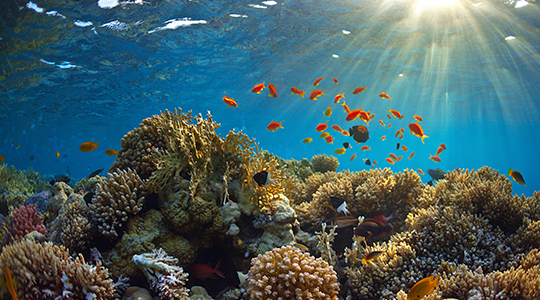This week, staff from the National Centers for Coastal Ocean Science (NCCOS) led special sessions and gave individual presentations at the 13th International Coral Reef Symposium in Honolulu, Hawaii. The symposium is one of the largest international gatherings that bring together researchers, managers, policy makers, non-governmental organizations, and the general public to share and discuss recent scientific information on coral reefs.
The special sessions addressed the latest findings on mesophotic coral ecosystems (30 -150 meters deep), including their role in sustaining shallow-water reefs; underwater acoustic ecology; and acoustic sampling surveys. Individual presentations focused on coral reef monitoring, pollution, socioeconomics, biogeographic assessments, and spatial ecology.

NCCOS coral reef research includes "middle light" mesophotic coral reefs, monitoring, pollution, socioeconomics, biogeographic assessments, spatial distributions, and how sound impacts and can be used to survey coral reefs. Credit: International Coral Reef Symposium.
Kimberly Puglise co-chaired the mesophotic coral session, with talks focused on how these ecosystems function and how they relate to their shallow-water counterparts. Puglise alsoco-chaired a session on connectivity, recruitment, and isolation among coral reef populations, especially the Pulley Ridge corals off southwest Florida.
Chris Taylor and Felix Martinez, along with other federal and academic scientists, chaired the soundscape ecology session, where talks covered how sound can be used to characterize the diversity of organisms in coral reefs, to study the ecology and behavior of single species, and to determine the impact of human-produced noise on marine organisms.
Editor's note: As of January 2021, the abstract links below are no longer available.
NCCOS Sessions
- Connectivity, Recruitment and Isolation Among Coral Reef Populations (session 15)
- Mesophotic and Deep-Sea Coral Ecosystems: A Tribute to the Pioneering Efforts of Dr. John Rooney (session 29)
- Acoustic, Optical, and Chemical Seascapes and Their Application to Restoration and Management (session 48)
NCCOS Presentations
- Dillard, M. K.; Edwards, P. E.; Levine, A.; Loerzel, J.; The Contributions of Socioeconomic Monitoring for Coral Reef Conservation in the U.S.
- Edwards, K. F.; Clark, R.; Hile, S. D.; Implementation of Large Scale Monitoring Programs as a Platform for Territorial Conservation and Management
- Hile, S. D.; Clark, R.; Beck, B.; Edwards, K.; Focusing on the Foundation: Early Stages of Data Generation and Management
- Kimball, J. B.; Brainard, R.; Monaco, M.; Bohnsack, J.; Clark, R.; Schull, J.; Manzello, D.; Enochs, I.; Oliver, T.; Williams, I.; Vargas-Ãngel, B.; Blondeau, J.; Edwards, P.; Eakin, C. M.; Kelsey, H.; Donovan, C. E.; Koss, J.; NOAA's National Coral Reef Monitoring Program: Integrated Ecosystem Monitoring and Reporting in U.S. Coral Reef Areas to Inform Conservation and Management
- Loerzel, J. L.; Goedeke, T. L.; Dillard, M. K.; Brown, G.; Professional SCUBA Divers Above the Waterline: Using Expert Assessment to Inform Coral Reef Management
- Monaco, M. E.; Biogeographic Assessments: A Framework for Information Synthesis in the Management of Coral Reef Ecosystems
- Pait, A. S.; Hartwell, S. I.; Apeti, A. D.; Mason, A. L.; Presence and Impacts of Land-Based Sources of Pollution in the St. Thomas East End Reserves, St. Thomas, USVI
- Pittman, S. J.; Poti, M.; Jeffrey, C.; Geodeke, T.; Dillard, M.; Loerzel, J.; Kracker, L.; A Decision Support Framework to Prioritize Coral Reefs for Conservation in the U.S. Virgin Islands
- Poti, M. D.; Kendall, M. S.; Macroplankton, Micronesia, and Mesoscale Movement Models: Quantifying Larval Transport Pathways Around the Mariana Archipelago
- Taylor, J. C.; Scharer-Umpierre, M.; Battista, T.; Mann, D.; Bruner, S. M.; Townsend, J. I.; Extending Soundscape Surveys of Coral Reefs Using Autonomous Ocean Gliders
- Whitall, D. R.; Quantification of Land Based Sources of Pollution in Support of Coral Reef Management: Case Studies from Two U.S. Coral Reef Task Force Priority Watersheds
NCCOS Poster
- Goedeke, T. L.; Orthmeyer, A. L.; Edwards, P. E.; Dillard, M. K.; Gorstein, M.; Jeffrey, C. F.; Characterizing Participation in Non-Commercial Fishing and Other Shore-Based Recreational Activities on St. Croix, USVI
For more information, contact Felix.Martinez@noaa.gov.
 Official websites use .gov
A .gov website belongs to an official government organization in the United States.
Official websites use .gov
A .gov website belongs to an official government organization in the United States. Secure .gov websites use HTTPS
A lock or https:// means you’ve safely connected to the .gov website. Share sensitive information only on official, secure websites.
Secure .gov websites use HTTPS
A lock or https:// means you’ve safely connected to the .gov website. Share sensitive information only on official, secure websites.